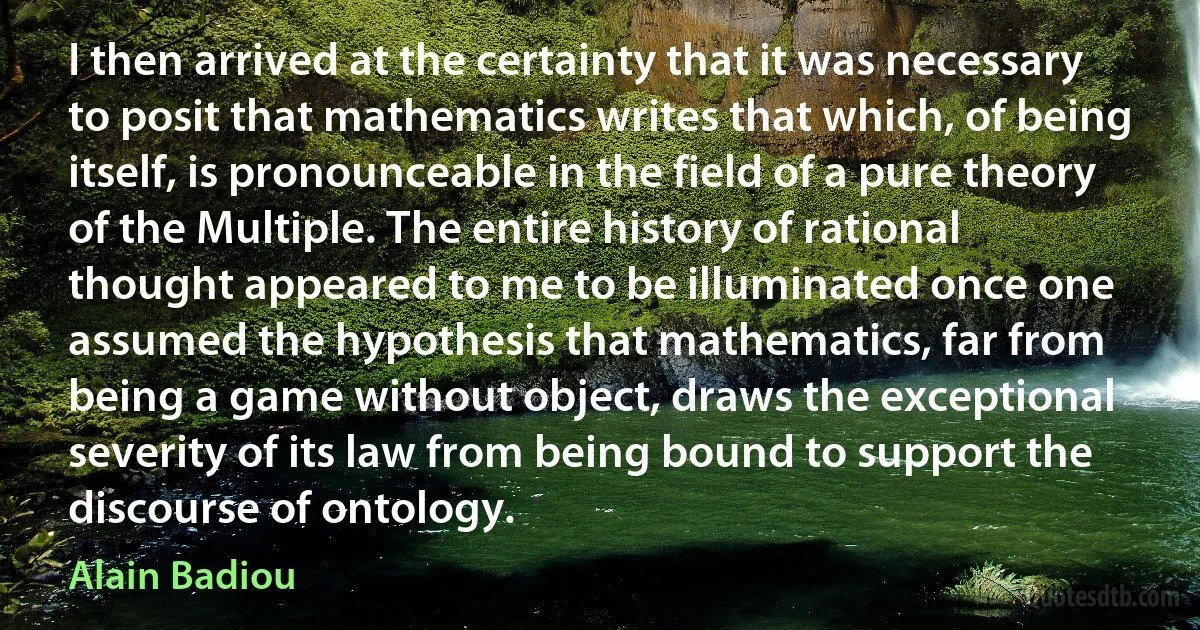Hypothesis Quotes - page 6
Neither Lynn Margulis nor I have ever proposed a teleological hypothesis. Nowhere in our writing do we express the idea that planetary self-regulation is purposeful, or involves planetary foresight or planning by the biota. ...Yet we met persistent, almost dogmatic, criticism that our hypothesis is teleological.

James Lovelock
They [mathematicians] only take those things into consideration, of which they have clear and distinct ideas, designating them by proper, adequate, and invariable names, and premising only a few axioms which are most noted and certain to investigate their affections and draw conclusions from them, and agreeably laying down a very few hypotheses, such as are in the highest degree consonant with reason and not to be denied by anyone in his right mind. In like manner they assign generations or causes easy to be understood and readily admitted by all, they preserve a most accurate order, every proposition immediately following from what is supposed and proved before, and reject all things howsoever specious and probable which can not be inferred and deduced after the same manner.-Barrow, Isaac.

Isaac Barrow
Science Of Energetics. Although the mechanical hypothesis just mentioned may be useful and interesting as a means of anticipating laws, and connecting the science of thermodynamics with that of ordinary mechanics, still it is to be remembered that the science of thermodynamics is by no means dependent for its certainty on that or any other hypothesis, having been now reduced, to a system of principles, or general facts, expressing strictly the results of experiment as to the relations between heat and motive power. In this point of view the laws of thermodynamics may be regarded as particular cases of more general laws, applicable to all such states of matter as constitute Energy, or the capacity to perform work, which more general laws form the basis of the science of energetics, - a science comprehending, as special branches, the theories of motion, heat, light, electricity, and all other physical phenomena.

William John Macquorn Rankine
I switched on the high speed recorder and it came blip.... blip.... blip.... blip.... blip.... Clearly the same family, the same sort of stuff and that was great, that was really sweet. It finally scotched the little green men hypothesis cos it's highly unlikely there's two lots of little green men, opposite sides of the universe, both deciding to signal to a rather inconspicuous planet earth, at the same time, using a daft technique and a rather common place frequency. It has to be some new kind of star, not seen before, and that then cleared the way for us publishing, going public!

Jocelyn Bell Burnell
Many people assert that this abandonment of the god hypothesis means the abandonment of all religion and all moral sanctions. This is simply not true. But it does mean, once our relief at jettisoning an outdated piece of ideological furniture is over, that we must construct some thing to take its place.

Julian Huxley
The assumption that, beneath economics, reality is psychosexual is often rejected as ahistorical by those who accept a dialectical materialist view of history because it seems to land us back where Marx began: groping through a fog of utopian hypotheses, philosophical systems that might be right, that might be wrong (there is no way to tell); systems that explain concrete historical developments by a priori categories of thought; historical materialism, however, attempted to explain 'knowing' by 'being' and not vice versa.

Shulamith Firestone
Induction was shown to be untenable as a scientific method by Popper in The Logic of Scientific Discovery (1959). Instead, advances in scientific understanding come ideally from hypothetico-deductivism: firstly, development of a hypothesis in relation to a problem situation, and secondly, its testing in relation to all relevant knowledge and furthermore by its great explanatory power.

John Carew Eccles
Persisting in their original resolve to destroy me and everything mine by any means they can think of, these men are aware of my views in astronomy and philosophy. They know that as to the arrangement of the parts of the universe, I hold the sun to be situated motionless in the center of the revolution of the celestial orbs while the earth revolves about the sun. They know also that I support this position not only by refuting the arguments of Ptolemy and Aristotle, but by producing many counter-arguments; in particular, some which relate to physical effects whose causes can perhaps be assigned in no other way. In addition there are astronomical arguments derived from many things in my new celestial discoveries that plainly confute the Ptolemaic system while admirably agreeing with and confirming the contrary hypothesis.

Galileo Galilei
When two hypotheses are possible, we provisionally choose that which our minds adjudge to be simpler, on the supposition that this is the more likely to lead in the direction of truth. It includes as a special case the principle of Occam's razor-entia non multiplicana praeter necessitatem.

James Jeans
Nietzsche proposes the following brilliant hypothesis: The bad conscience is the deep-seated morbid condition that declared itself in man under the stress of the most radical change he has ever experienced when he found himself imprisoned in perpetuity within a society which was in- violable. All the strong and savage instincts such as adventurousness, rashness, cunning, rapacity, lust of power, which till then had not only been honoured, but actually encouraged, were suddenly put down as dangerous, and by degrees branded as immoral and criminal. Creatures adapted to a roving life of war and adventure suddenly saw all their instincts classed as worthless, nay, as forbidden. An immense despondency, a dejection without parallel, then took possession of them. And all these instincts that were not allowed an outward vent, turned inwards on the man himself feelings of enmity, cruelty, ... violence, persecution, destruction and thus the bad conscience originated.

Georg Brandes
Very evocative. He seems to be confirming what I said last year-that the universe really has no underpinnings, that when a good hypothesis comes along, one that explains the prior events, the underpinnings shape themselves to accommodate and a powerful theory is born.”
"Then there is no ultimate reality?”
"Apparently not. Bad hypotheses, those that don't fit what happen on our level, are rejected by the universe. Good ones, powerful ones, are incorporated.

Greg Bear

![[Schultz specifically refers to the manner in which inputs are used when he states that one implication of his] efficient but poor hypothesis... [is] that the combination of crops grown, the number of times and depth of cultivation, the time of planting, watering, and harvesting, the combination of hand tools, ditches to carry water to the fields, draft animals and simple equipment -- are all made with a fine regard for marginal costs. (Theodore Schultz)](https://cdn.quotesdtb.com/img/quotes_images_webp/39/theodore-schultz-carry-combination-321539.webp)

